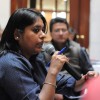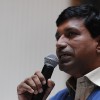Summary
[youtube iCy371H6gbc]
Vesna Roch (SDC HQ) presented the main comparative advantages of SDC in supporting electoral processes, based on the conclus ions of a survey conducted in six Cooperation Offices in 2010 (Afghanistan, Bangladesh, Bosnia & Herzegovina, India, Mozambique, Pakistan). She highlighted lessons learnt by the country teams, e.g. the importance of long term commitment in electoral support and the relevance of interventions at different levels of the State. The focus on domestic observation has also proven to be a success in most of the cases. Vesna Roch concluded by saying that SDC’s network of partners in the field represents an added value in the electoral processes.
ions of a survey conducted in six Cooperation Offices in 2010 (Afghanistan, Bangladesh, Bosnia & Herzegovina, India, Mozambique, Pakistan). She highlighted lessons learnt by the country teams, e.g. the importance of long term commitment in electoral support and the relevance of interventions at different levels of the State. The focus on domestic observation has also proven to be a success in most of the cases. Vesna Roch concluded by saying that SDC’s network of partners in the field represents an added value in the electoral processes.
[youtube 7nGNQc0yJjQ]
Preeta Lall (SDC India) presented a case study from India, explaining the support that SDC made available to the Pre-Election Voters Awareness Campaign (PEVAC). PEVAC promotes free and fair elections, downward accountability and citizenship. It is a mix of an awareness campaign and an election watch process which is undertaken by NGOs and small community-based organizations (including youth clubs and self-help groups). It is a means of ensuring against corruption and violence during elections and promoting elections on development agendas. So far, as many as 18 States of India have gone through the PEVAC process and evidence of its success is found in the State Election Commissions, now partnering with civil society to support PEVAC.
Awareness Campaign (PEVAC). PEVAC promotes free and fair elections, downward accountability and citizenship. It is a mix of an awareness campaign and an election watch process which is undertaken by NGOs and small community-based organizations (including youth clubs and self-help groups). It is a means of ensuring against corruption and violence during elections and promoting elections on development agendas. So far, as many as 18 States of India have gone through the PEVAC process and evidence of its success is found in the State Election Commissions, now partnering with civil society to support PEVAC.
[youtube TaVox9E1ImM]
Tommaso Tabet and Sohel Ibn Ali (SDC Bangladesh) presented the experiences from Bangladesh, where SDC has supported the national, cantonal and communal election processes (2008-2011), seizing the opportunity of funding a national coalition of 32 NGOs for a tight monitoring of the election processes and basic civic education activities. An evaluation/capitalization of this experience is planned early 2012.
After the two case studies, all the participants discussed in groups why it is important, for an institution like SDC, to analyze electoral processes and get engaged in election assistance programs. They also reflected on the links between electoral processes and local governance.
In his concluding remarks, Kuno Schläfli thanked the participants for the rich harvest of comments and proposals. The topic of democr acy promotion via election support is evolving in a dynamic manner, due to the current events in Northern Africa which push SDC to position itself in support to these movements. Therefore it is not possible to say today how the DLGN will follow up on the topic. In all the cases, this facet of our thematic area is growing in relevance and importance. The contributions of the network members will enrich our reflections on a policy level in the coming weeks.
acy promotion via election support is evolving in a dynamic manner, due to the current events in Northern Africa which push SDC to position itself in support to these movements. Therefore it is not possible to say today how the DLGN will follow up on the topic. In all the cases, this facet of our thematic area is growing in relevance and importance. The contributions of the network members will enrich our reflections on a policy level in the coming weeks.
Vesna Roch
Video Reporter: Hynek Bures
